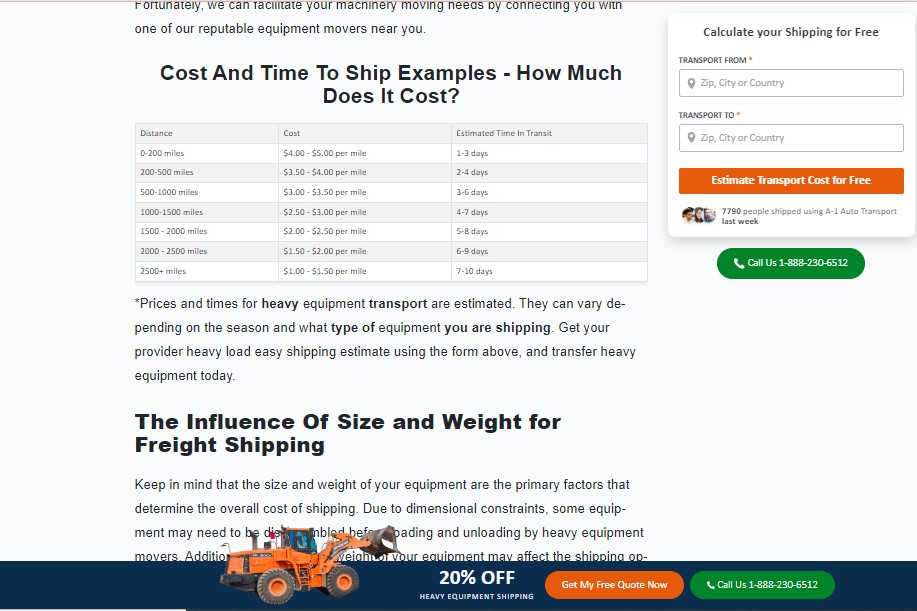When it comes to shipping a heavy car, there are a lot of factors to consider. As an expert in the auto transport industry, I have seen firsthand the challenges and complexities that come with transporting heavy vehicles. From choosing the right carrier to navigating regulations and logistics, there is a lot that goes into ensuring a successful shipment.
The A1 Auto Transport site is incredibly helpful to determine your transport costs, get a free quote here:

The Importance of Choosing the Right Carrier
One of the most crucial aspects of heavy car shipping is selecting the right carrier. This is especially important because heavy vehicles require specialized equipment and expertise to transport safely. It's not as simple as loading a car onto a trailer and hitting the road.
When looking for a carrier, it's essential to do your research and choose one with experience in transporting heavy vehicles. They should have the necessary equipment, such as flatbed trailers or lowboy trailers, to handle the weight and size of your car. It's also crucial to check their insurance coverage and reputation in the industry.
Heavy car shipping also requires proper loading and securing techniques. The carrier should have experience in properly loading and securing heavy vehicles to prevent any damage during transit. This includes using straps, chains, and other equipment to secure the car in place.
Understanding Regulations and Logistics
Another aspect of heavy car shipping that requires expertise is navigating regulations and logistics. Depending on the size and weight of your vehicle, there may be specific regulations that need to be followed for transportation. This could include obtaining permits or adhering to weight restrictions on certain roads.
Additionally, logistics play a significant role in heavy car shipping. The carrier needs to plan out the route carefully, taking into account any potential obstacles or challenges along the way. This could include low bridges, narrow roads, or weight restrictions on certain highways.
It's also essential to consider the timing of the shipment. Heavy vehicles may require longer transit times due to their size and weight, so it's crucial to plan accordingly. Delays can also occur due to weather conditions or unexpected road closures, so it's essential to have a contingency plan in place.
The Cost of Heavy Car Shipping
One of the most common questions I get asked as an expert in heavy car shipping is about the cost. The truth is, there is no one-size-fits-all answer. The cost of shipping a heavy car will depend on various factors, including the distance, type of carrier, and any additional services needed.
Generally, shipping a heavy car will be more expensive than a standard vehicle due to the specialized equipment and expertise required. However, it's essential to get quotes from multiple carriers and compare their services and prices before making a decision.
Heavy car shipping companies may also offer additional services that can add to the overall cost. For example, if your vehicle is not in running condition, you may need to pay for loading and unloading services. Or if you want your car to be shipped in an enclosed trailer for added protection, that will come at an extra cost.
Tips for a Successful Heavy Car Shipment
As an expert in the industry, I have some tips for anyone looking to ship a heavy car. First and foremost, do your research and choose a reputable carrier with experience in transporting heavy vehicles. Don't be afraid to ask for references or check online reviews.
It's also essential to properly prepare your vehicle for shipment. This includes removing any personal belongings and ensuring that the car is clean and free of any loose parts. You should also take photos of your vehicle before shipment to document its condition in case of any damage during transit.
Lastly, make sure to communicate clearly with the carrier and ask any questions you may have. They should be able to provide you with a detailed timeline and keep you updated throughout the shipment process.
In Conclusion
Heavy car shipping is a complex process that requires expertise and attention to detail. From choosing the right carrier to navigating regulations and logistics, there is a lot that goes into ensuring a successful shipment. By following these tips and working with a reputable carrier, you can have peace of mind knowing that your heavy vehicle will arrive at its destination safely and on time.






